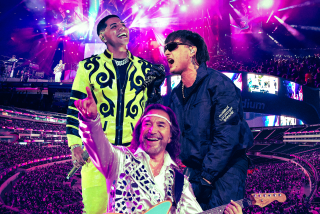A New Name, A New Alternative in O.C. Nightlife
In Orange County, it’s usually time to worry when a live-music club is sold. That’s why the recent sale of Club Mesa in Costa Mesa initially sounded troublesome to supporters of a venue that had long fostered Southland punk and alternative music.
Big changes will, in fact, be apparent when the club that’s tucked into an old strip mall reopens Friday, not the least of which is the new name: Bye-bye Club Mesa, hello Detroit Bar.
The pedigree of the team launching Detroit Bar should help reassure fans that they haven’t lost a beloved nightspot; they’re simply gaining a snazzy new one.
That team is headed by the trio that owns the Memphis Soul Cafe & Bar in Costa Mesa--Dan Bradley, Andy Christenson and Diego Velascov--who have developed Memphis into a popular meeting place for what Bradley calls “Orange County urbanites.”
Another key part of the Detroit Bar team is talent booker Chris Fahey, a veteran of the Orange County music scene. Fahey has promoted shows at various clubs (Our House, Club Mesa, Newport Station’s Lava Room) and as tour manager for the Muffs, the Jon Spencer Blues Explosion and, currently Stereolab, which not coincidentally inaugurates the new space with a show Friday that’s already a sellout.
Together they’re hoping to transform what had been a divey nightspot that in recent years had trouble regularly filling the room with anything except the most popular punk acts into a hip, well-appointed neighborhood bar that would be to music cognoscenti what Memphis Cafe has become to foodies: a favorite place to hang out. They’re also hoping to put a bit of a spin on the traditional notion of a live-music venue.
Said Fahey: “We’re not necessarily looking to compete with the Galaxy [Concert Theatre],” which is a few miles away in Santa Ana. “We’ll be trying to get the people who wouldn’t normally be seen in a club, or not normally play in Orange County . . . It’s not going to be [snooty]. It will be more upscale than Club Mesa was, but we’re not going to be turning anybody away either.”
Fahey was joined by Bradley during an interview at a Mexican restaurant two doors down as both took a break from overseeing construction work. A crew was busily gutting the interior, sandblasting the exterior stonework, excavating terrazzo flooring and installing such new appointments as framed windows and a lighted, walnut elbow bar off the stage, which is also undergoing a facelift. Club Mesa’s 250-capacity limit remains for now.
“I’d like to see bands come in and do residencies, like they do at Spaceland [in Los Angeles], where the same band might come in every Monday night and start to nurture a crowd,” Fahey says. “I like the idea where other people who just stop in on a Monday night will look up and see a band they’ve never seen before, and suddenly that band will have another fan.
“We want to provide customers and the bands with a really cool place to go where they can have a drink and enjoy themselves,” Fahey said. “We’ll have deejays, people doing computer and electronic music, and we’re working on trying to make our jukebox one of the best on the West Coast.”
Music, however, will be one component of Detroit Bar’s formula rather than its raison d’etre.
“The concept,” says Bradley, “and the reason for incorporating the word ‘bar’ into the name is that it’s a bar and lounge first, and a music venue second. We didn’t want to [rely] on bands to make it work. We’d rather have it become kind of a community center.” When live music is offered--two or three times a week--it will be an even mix of local and touring acts. Stylistically, the music, whether live or deejay-spun, will run from alternative pop and rock to electronica and groove sounds to jazz.
“We want to try to make it not as predictable as Club Mesa was,” Fahey says. “Craig [McGahey, Club Mesa’s longtime booking agent] booked a lot of good stuff, but there was not a lot of diversity.”
Bradley and Fahey said they anticipate tapping McGahey periodically to book shows into Detroit Bar as an independent promoter.
Because the facility has no kitchen, Bradley said they’ll provide some items generated at Memphis, where the food has a strong American-regional bent.
Bradley says Costa Mesa officials have been helpful with the transformation of Club Mesa into Detroit Bar. That’s a dramatic change from 20 years ago, when the same neighborhood was in the midst of the battle between authorities and young music fans.
“For patrons and bands,” Bradley says, “we just want to create a real warm, fuzzy, vibey kid of place.”
*
Stereolab appears Friday at Detroit Bar, 843 W. 19th St., Costa Mesa. 9 p.m. With Papa M. Sold out. (949) 642-0600.
More to Read
Sign up for Essential California
The most important California stories and recommendations in your inbox every morning.
You may occasionally receive promotional content from the Los Angeles Times.









